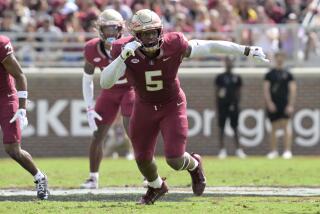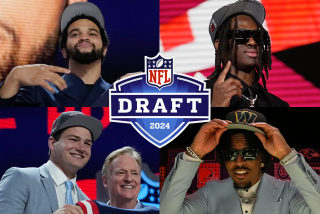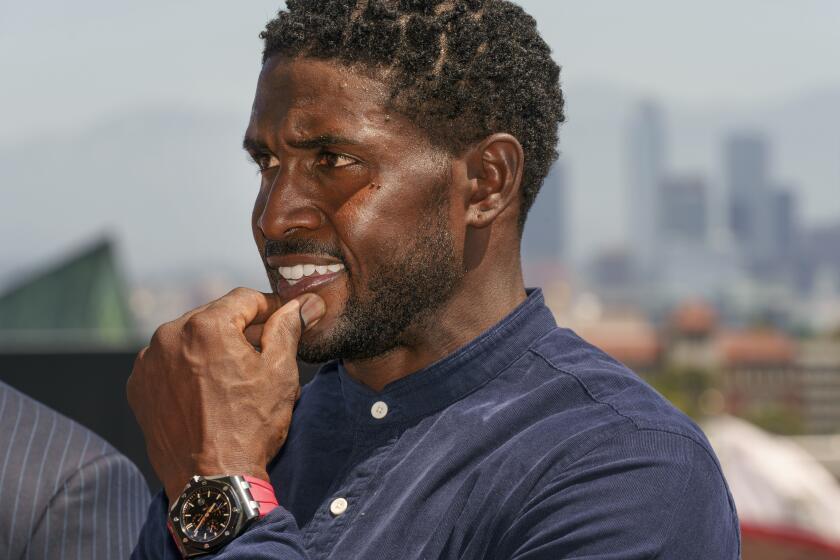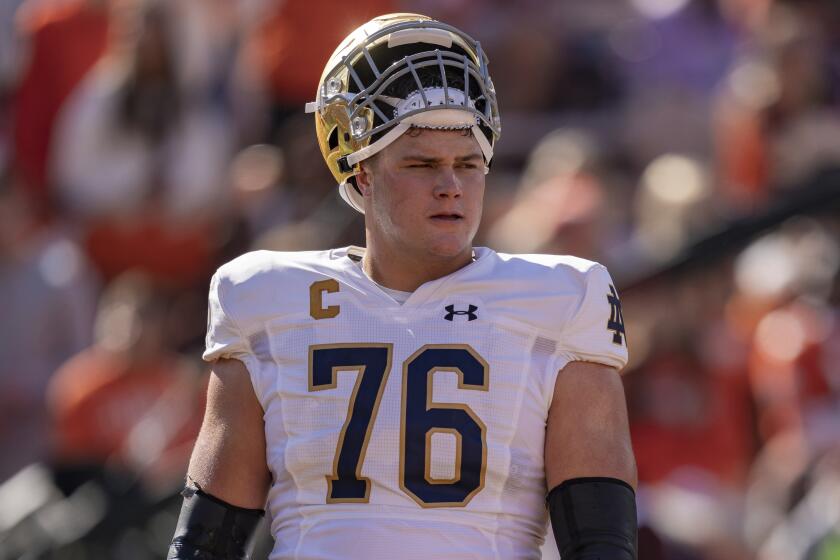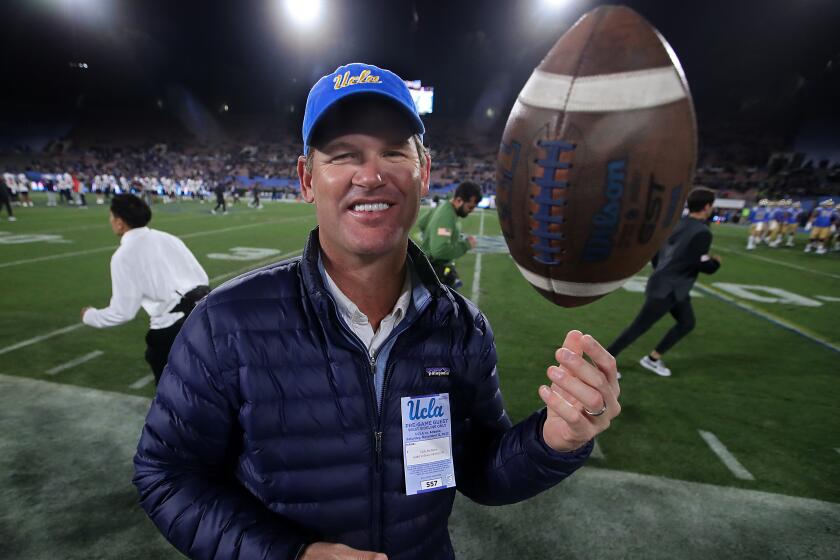Record-setting Grambling coach made civil rights part of game plan
Eddie Robinson, the record-setting coach who turned Grambling State University into a nationally recognized football power, ushered more than 200 players into the National Football League and largely realized his vision of transforming the Louisiana school into the Notre Dame of historically black colleges, has died. He was 88.
Robinson, who for nearly two decades held college football’s record for most victories, died Tuesday night at Northern Louisiana Medical Center in Ruston, La., the university announced. The cause of death was not specified, but he had been suffering from Alzheimer’s disease.
For the record:
12:00 a.m. April 7, 2007 For The Record
Los Angeles Times Saturday April 07, 2007 Home Edition Main News Part A Page 2 National Desk 0 inches; 29 words Type of Material: Correction
Robinson obituary: The obituary of former Grambling football Coach Eddie Robinson in Thursday’s Section A identified one of Robinson’s former players as Willis Davis. His name is Willie Davis.
Starting in 1941 at age 22, Robinson coached at Grambling for 57 seasons. He had a career mark of 408-165-15 when he was forced to retire in 1997.
His nearly six-decade tenure at Grambling spanned dramatic social change. Robinson navigated his teams through Jim Crow laws in the 1940s and the civil rights movement, and his career ended after the fall of the Soviet Union, the rise of the AIDS epidemic and the beginning of the Internet boom.
His 408 wins stood as the most by a football coach at any collegiate level until November 2003, when John Gagliardi topped Robinson by notching his 409th victory for St. John’s, a Division III school in Minnesota.
Robinson recorded his 324th career win when his team defeated Prairie View A&M; on Oct. 5, 1985. That victory allowed him to surpass Alabama’s Paul “Bear” Bryant to become college football’s winningest coach
“There is no question that Eddie Robinson was a figure that was larger than life for most African American young men of that era,” said University of Washington Coach Tyrone Willingham, one of five black head coaches in Division IA during the 2006 college football season. “At that time, Grambling was The Program and Eddie Robinson was The Man.... He stood for all the right things.”
At the peak of his power, Robinson proudly paraded his Tiger teams around the country on “barnstorming” tours, a Deep South version of Notre Dame’s Fighting Irish football team.
The school hired a public relations man to orchestrate a national publicity campaign as Grambling scheduled games against other historically black schools in venues that included Yankee Stadium, the Rose Bowl and the Los Angeles Coliseum.
Robinson’s effect on college football was profound. His Grambling teams won nine National Black College championships and 17 Southwestern Athletic Conference titles and had only eight losing seasons.
In 1949, Grambling star Paul “Tank” Younger joined the Los Angeles Rams, becoming the first player from a historically black college to sign with an NFL team.
Four former players -- Buck Buchanan, Willis Davis, Willie Brown and Charlie Joiner -- are members of the Pro Football Hall of Fame.
At one point in the early 1970s, there were 43 former Grambling players in NFL training camps.
On Jan. 31, 1988, with Robinson seated in the stands at San Diego’s Jack Murphy Stadium, former Grambling star quarterback Doug Williams led the Washington Redskins to a win over the Denver Broncos in Super Bowl XXII. Williams, the first African American quarterback to play in a Super Bowl, threw four touchdown passes and was named the game’s most valuable player.
“For the Grambling family, this is a very emotional time,” Williams said Wednesday. “But I’m thinking about Eddie Robinson the man, not in today-time, but in the day and what he meant to me and to so many people.”
Robinson was affectionately known as “Coach Rob” and liked to boast that his proudest accomplishments were “having one job and one wife.”
He was a champion of equal rights who tried to effect change by working within established boundaries and avoiding confrontation. He believed the success of Grambling players, on and off the field, served to advance the cause of civil rights.
At the height of civil unrest in the 1960s, Robinson insisted that his players stand at attention during the playing of the national anthem.
“I don’t believe anybody can out-American me,” Robinson often said.
Surpassing Bryant in 1985 was a watershed event, though Robinson downplayed the significance of his eclipsing the record of a man who coached at a school -- the University of Alabama -- that did not integrate its football squad until 1971.
Robinson railed against prejudice but refused to allow racism to keep him from his destiny.
“You know, I’ve lived so long. I’ve seen a lot,” he once said. “I have ridden on the back of the bus. I’ve drunk at segregated fountains. But I ain’t trying to make nobody pay. All I wanted was an opportunity to prove that I can do what other people can do. I got that at Grambling.”
A highlight of Robinson’s life came in New Orleans in 1974, when 76,000 fans watched Grambling play traditional rival Southern University at Tulane Stadium.
“When I was in college, no blacks could play there or watch games there,” he told a Times reporter in 1985. “I’m standing there on the field, crying because I remember what it was like. For the players, it was a game. For me, it was walls falling down.”
What Robinson cared about, almost above all else, was winning.
On the field, Robinson was fiercely competitive, and he fielded teams that routinely pounded opponents with simple plays, meticulous preparation and overwhelming talent.
“Winning is not a sometimes thing,” he said. “It’s an all-the-time thing.”
Off the field, he was soft-spoken, slump-shouldered and liked to quote works of literature.
Edward Gay Robinson, the son of a sharecropper and a domestic worker, was born Feb. 13, 1919, in Jackson, La. His parents, who would later divorce, moved to Baton Rouge when Eddie was 8.
Robinson played at McKinley High School and later was a star quarterback for now-defunct Leland College in Baker, La. He earned a bachelor’s degree in English from Leland, and later a master’s degree in physical education from the University of Iowa.
He could not find a coaching job after college, however, and took a day job at a Baton Rouge feed mill while working nights on an ice wagon.
In May 1941, he married Doris Mott, his high school sweetheart, who had an aunt who worked at Grambling, when it was known as Louisiana Negro Normal and Industrial Institute and consisted of five buildings surrounded mostly by peach orchards and hog farms.
Doris’ aunt told Eddie there was an opening for a football coach, and he was named the school’s coach in August 1941.
Along with his football duties, Robinson coached the basketball and baseball teams, mowed the fields, taped ankles and wrote game accounts for local newspapers. His salary was $63.75 per month.
Robinson struggled during his first season, going 3-5, but his 1942 squad finished 9-0 and did not allow a point.
Grambling did not field a team in 1943 or ’44 because of World War II.
In 1945 when football resumed, Robinson faced a problem when the father of his top two players pulled his sons off the squad because he needed them to pick cotton.
In one of his first bold coaching strokes, Robinson got the players back.
“I got all the boys on the team and we went out there to pick the cotton and went on to win the championship,” he once recalled.
Robinson was more than a winning coach. He taught players discipline and etiquette; many did not know how to eat properly with a knife and fork. His players would travel to games dressed in suits and ties. He kept players in spiritual line by insisting on handing out weekly laundry stipends at church.
“He gave us a way of looking at life,” said Everson Walls, who played cornerback at Grambling and in the NFL. “He used to say first one to cry is a sissy. That was his way of saying there are no excuses. He always wanted us to look for a way to succeed, not a reason to fail.”
With black players unable to attend major colleges in the South because of segregation, Robinson stocked his early Grambling squads with a remarkable array of football talent.
Scores of Grambling players ended up becoming NFL stars, among them Buchanan, Davis, Joiner, Brown, Williams, Ernie Ladd, Gary “Big Hands” Johnson and James Harris, who played quarterback with the Los Angeles Rams.
Robinson’s reign would begin to wane after major Southern colleges started to integrate their rosters in the 1960s.
Robinson did not try to stop his players from leaving, once telling the Cleveland Plain Dealer, “It was very difficult for me, as a coach, to watch Martin Luther King with his marches and what they stood for, then tell a guy don’t go” to a white school.
Robinson maintained a high profile at Grambling when few blacks reached his level. Williams Jeffries became the first black head football coach in Division IA, college football’s top level, when he was hired at Wichita State in 1979. Only a handful have followed him.
Robinson’s last few years as a coach were not without controversy.
Former Grambling President Raymond Hicks wanted to force him out in 1996 after Robinson’s teams posted consecutive losing seasons. But when word leaked out, then-Louisiana Gov. Mike Foster stepped in and said Robinson, then 77, deserved another year.
Robinson reluctantly agreed to resign in 1997, after his second straight 3-8 season and an NCAA inquiry that resulted in probation for minor violations.
After retirement, Robinson retreated to the modest brick house he and Doris, a schoolteacher, had lived in for years -- a short walk from the Grambling campus.
In addition to his wife of 65 years, Robinson’s survivors include son Eddie Robinson Jr., a player and assistant coach under his father at Grambling; daughter Lillian Berry; five grandchildren; and nine great-grandchildren.
A funeral will be held at 11 a.m. Wednesday at the Grambling Assembly Center next to Robinson Stadium, followed by burial at Memorial Gardens in Grambling.
Instead of flowers, donations can be made to the Friends of the Eddie G. Robinson Museum, P.O. Box 550, Grambling, LA 71245. For details, go to www.robinsonmuseum.com.
*
*
Begin text of infobox
Voices
‘I don’t know if I would be where I am today if there had been no Eddie Robinson. He put that spark into everyone, that will to be more, to be the best.’
-- Doug Williams, former Grambling and NFL quarterback
*
‘Coach Rob did a lot more for us than teach us about football. He used to come through the halls early in the morning with a cowbell, waking us up for class and for church.’
-- Everson Walls, former Gambling and NFL cornerback
*
‘The coaching profession has lost one of its true legends. Though he was best known for winning more football games than any other coach when he retired, Eddie Robinson’s impact on coaching and the game of football went far beyond wins and losses.’
-- Grant Teaff, executive director of the American Football Coaches Assn.
*
‘He was a role model and a pacesetter. He took black college football to the big stadiums nationally and internationally.’
-- The Rev. Jesse Jackson
*
‘Today we mourn the loss of a great Louisianan and a true American hero. Coach Eddie Robinson became the most successful college coach of all time and one of the greatest civil rights pioneers in our history.’
-- Louisiana Gov. Kathleen Blanco
*
‘Eddie Robinson’s name is synonymous with the sport of football. We will be forever grateful for the more than 200 young men he developed at Grambling who starred in the NFL and those who later coached the next generation of NFL players.’
-- Roger Goodell, NFL commissioner
*
‘Wow, this guy was bigger than life itself. He really impressed me by the way he handled himself, what he believed in and what he stood for.... I couldn’t have learned from a better coach than Robinson.’
-- Willie Brown, Raiders assistant coach and former NFL and Grambling star
More to Read
Get our high school sports newsletter
Prep Rally is devoted to the SoCal high school sports experience, bringing you scores, stories and a behind-the-scenes look at what makes prep sports so popular.
You may occasionally receive promotional content from the Los Angeles Times.

